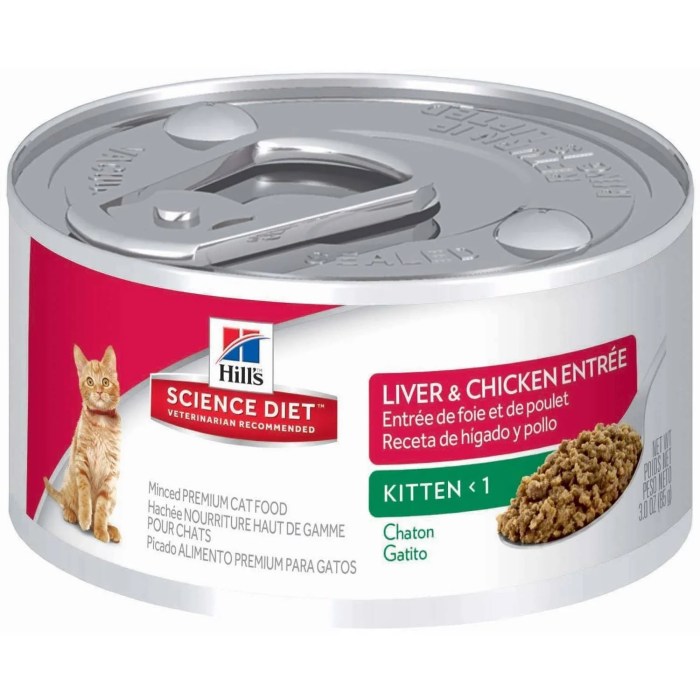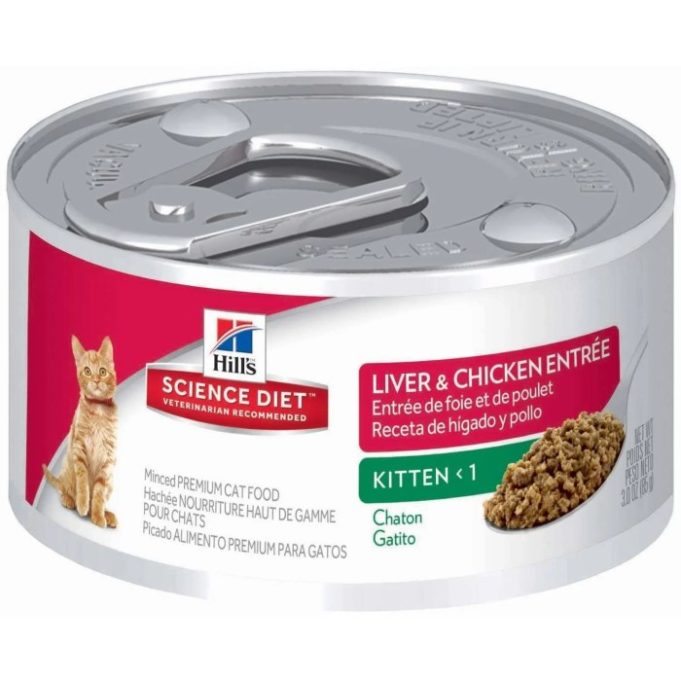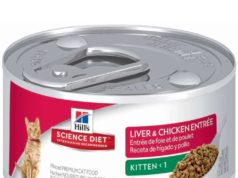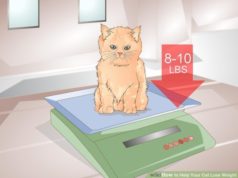Is Science Diet good for cats? This question often arises among cat owners seeking the best nutrition for their feline companions. Science Diet, a well-known brand of pet food, has been a staple in many homes for decades. Their commitment to scientific research and development has earned them a reputation for quality and innovation. But with countless cat food options available, it’s essential to understand the pros and cons of Science Diet to determine if it aligns with your cat’s individual needs.
This comprehensive review delves into the history, ingredients, nutritional benefits, and potential drawbacks of Science Diet cat food. We’ll analyze its suitability for various cat breeds and life stages, explore consumer feedback, and examine alternative brands to provide a well-rounded perspective. By the end, you’ll have a clearer understanding of whether Science Diet is the right choice for your furry friend.
Science Diet
Science Diet is a popular brand of pet food produced by Hill’s Pet Nutrition. It’s known for its focus on scientific research and development, aiming to provide complete and balanced nutrition for cats and dogs.
History of Science Diet and Hill’s Pet Nutrition
Hill’s Pet Nutrition was founded in 1939 by Dr. Mark L. Morris Sr., a veterinarian who noticed the lack of nutritional options for pets with health problems. He began formulating special diets for his patients, which led to the development of the first Science Diet products. The company has since grown into a global leader in pet nutrition, with a mission to help pets live longer, healthier lives.
Science Diet’s Mission and Core Values
Hill’s Pet Nutrition’s mission is to help enrich and lengthen the special relationships between people and their pets. The company’s core values are:
- Scientific Excellence: Hill’s believes in the power of science to improve pet health. They invest heavily in research and development, working with leading veterinarians and nutritionists to create the best possible products.
- Quality and Safety: Hill’s is committed to producing high-quality, safe pet food that meets the nutritional needs of all pets.
- Passion for Pets: Hill’s employees are passionate about pets and dedicated to helping them live their best lives.
Science Diet’s Approach to Formulating Cat Food
Science Diet cat food is formulated based on the specific nutritional needs of cats at different life stages. This includes factors like age, breed, activity level, and health conditions. The brand’s approach to formulating cat food includes:
- Understanding Cat Biology: Hill’s scientists study the nutritional needs of cats, taking into account their unique digestive systems, metabolic processes, and dietary requirements.
- Using High-Quality Ingredients: Science Diet uses high-quality ingredients, including animal protein, healthy fats, and essential vitamins and minerals.
- Scientifically Balanced Formulas: All Science Diet cat food formulas are scientifically balanced to provide complete and balanced nutrition for cats.
Research and Development Process Behind Science Diet Products
Science Diet products are backed by extensive research and development. The company has a team of scientists, veterinarians, and nutritionists who work together to develop new formulas and improve existing products. This process includes:
- Clinical Trials: Hill’s conducts clinical trials to test the effectiveness of its formulas and ensure they meet the needs of cats.
- Collaboration with Experts: Hill’s collaborates with leading veterinarians and nutritionists to ensure its products are based on the latest scientific knowledge.
- Ongoing Research: Hill’s is committed to ongoing research and development, constantly seeking new ways to improve pet health.
Ingredient Analysis
Understanding the ingredients in your cat’s food is crucial for ensuring their health and well-being. Analyzing the ingredient list can help you make informed decisions about the best diet for your feline companion.
Key Ingredients in Science Diet Cat Food
Science Diet cat food formulas typically feature a variety of ingredients, with meat-based proteins being a primary focus. Common ingredients include:
- Meat and Meat By-Products: These provide essential protein and amino acids for cats. Examples include chicken, turkey, fish, and beef.
- Animal Fat: Provides energy and essential fatty acids. Examples include chicken fat, poultry fat, and fish oil.
- Grains: Often included as a source of carbohydrates. Common grains include corn, wheat, and rice.
- Vegetable Products: Offer fiber, vitamins, and minerals. Examples include peas, potatoes, and carrots.
- Vitamins and Minerals: Added to supplement the natural nutrient content of the ingredients.
Comparing Science Diet’s Ingredient List to Other Brands
Comparing ingredient lists across different cat food brands can be helpful for determining the quality and nutritional value of each product.
- High-Quality Brands: Typically feature a higher percentage of meat-based proteins and fewer fillers, such as grains. Examples include Royal Canin, Purina Pro Plan, and Hill’s Science Diet.
- Lower-Quality Brands: May contain a higher percentage of fillers, by-products, and artificial ingredients. These brands often have a lower price point.
Potential Allergens and Sensitivities
Some cats may have allergies or sensitivities to certain ingredients commonly found in cat food.
- Common Allergens: Beef, dairy, fish, chicken, wheat, soy, and corn are common allergens in cats.
- Signs of Allergies: Symptoms can include itching, hair loss, gastrointestinal issues, and respiratory problems.
Animal By-Products and Their Impact on Cat Health
Animal by-products are often included in cat food as a source of protein and nutrients. These by-products can include meat scraps, organs, and bones.
- Quality Variations: The quality of animal by-products can vary significantly depending on the source and processing methods.
- Potential Concerns: Some concerns regarding animal by-products include potential contamination with bacteria or toxins, and lower digestibility compared to whole meat sources.
Nutritional Benefits
Science Diet cat food is formulated to provide a complete and balanced diet for cats of all ages and life stages. It is designed to meet the specific nutritional needs of cats, including their protein requirements, essential fatty acids, and vitamins.
Protein Content
Science Diet cat food is formulated with high-quality protein sources, such as chicken, fish, and lamb. Protein is essential for building and maintaining muscle mass, as well as supporting healthy skin and coat. The protein content in Science Diet formulas varies depending on the specific needs of the cat. For example, kittens require higher protein levels for growth and development, while senior cats may need lower protein levels to support their aging kidneys.
Essential Fatty Acids
Science Diet cat food contains essential fatty acids, such as omega-3 and omega-6 fatty acids. These fatty acids are important for maintaining healthy skin and coat, as well as supporting brain function and vision. Omega-3 fatty acids, in particular, have been shown to have anti-inflammatory properties.
Vitamins, Is science diet good for cats
Science Diet cat food is fortified with essential vitamins, such as vitamin A, vitamin D, vitamin E, and vitamin K. These vitamins are crucial for a variety of bodily functions, including immune system health, bone health, and vision.
Nutritional Profiles of Different Science Diet Formulas
Science Diet offers a wide range of formulas to meet the specific needs of cats at different life stages.
Formulas for Kittens
Science Diet Kitten formulas are formulated to meet the high nutritional demands of growing kittens. They contain higher levels of protein, fat, and calories to support rapid growth and development. They also contain essential nutrients, such as taurine, which is important for healthy heart and eye development.
Formulas for Adult Cats
Science Diet Adult formulas are formulated to meet the nutritional needs of adult cats. They provide a balanced blend of protein, fat, and carbohydrates to support healthy weight and energy levels. They also contain essential nutrients, such as antioxidants, to support immune system health.
Formulas for Senior Cats
Science Diet Senior formulas are formulated to meet the specific needs of senior cats. They contain lower levels of protein and phosphorus to support healthy kidney function. They also contain glucosamine and chondroitin to support joint health.
Addressing Specific Health Concerns
Science Diet offers formulas that are specifically designed to address certain health concerns.
Weight Management
Science Diet Weight Management formulas are formulated to help cats lose weight or maintain a healthy weight. They contain fewer calories and higher fiber content to help cats feel full and satisfied.
Urinary Tract Health
Science Diet Urinary Tract Health formulas are formulated to help prevent and manage urinary tract problems in cats. They contain a low level of magnesium and a controlled pH to help reduce the risk of urinary tract stones.
Cat Health and Well-being: Is Science Diet Good For Cats
Science Diet is a popular brand of cat food known for its wide range of formulas designed to meet the specific nutritional needs of cats at different life stages and with varying health conditions. While it offers potential benefits for many cats, it’s crucial to understand both the advantages and potential drawbacks of feeding Science Diet to your feline companion.
Benefits for Cats with Specific Health Conditions
Science Diet offers specialized formulas designed to address various health concerns in cats. Here are some examples:
- Allergies: Science Diet’s “Sensitive Skin & Stomach” formula is designed to reduce food sensitivities and skin irritations by using hydrolyzed protein sources, which are broken down into smaller, less allergenic molecules. It also includes prebiotics to promote gut health and reduce inflammation.
- Diabetes: The “Diabetes Management” formula is formulated with controlled carbohydrate levels and a high protein content to help manage blood glucose levels in diabetic cats. It also includes L-carnitine, an amino acid that helps convert fat into energy.
- Kidney Disease: The “Kidney Care” formula is formulated with reduced phosphorus and protein levels, which can help reduce stress on the kidneys in cats with kidney disease. It also includes omega-3 fatty acids, which have anti-inflammatory properties and can help protect the kidneys from further damage.
Potential Risks and Drawbacks
While Science Diet offers several benefits, there are potential risks and drawbacks to consider:
- Ingredient Quality: Some Science Diet formulas contain ingredients that may not be of the highest quality, such as by-products or artificial flavors and colors. It’s essential to carefully review the ingredient list and choose formulas with high-quality protein sources, fruits, and vegetables.
- Potential for Allergies: Even though Science Diet offers formulas designed for cats with allergies, some cats may still develop sensitivities to certain ingredients, such as chicken, fish, or grains. It’s important to monitor your cat for any signs of allergies, such as skin irritation, vomiting, or diarrhea.
- Cost: Science Diet can be relatively expensive compared to other cat food brands. This can be a significant consideration for budget-conscious pet owners.
Impact on Coat, Energy Levels, and Overall Well-being
A balanced diet can significantly impact a cat’s coat, energy levels, and overall well-being. Science Diet’s formulas are designed to provide essential nutrients for healthy skin and a shiny coat. The inclusion of omega-3 fatty acids can promote a healthy coat and skin, while high-quality protein sources can support muscle mass and energy levels.
Nutritional Content Comparison
Here’s a table comparing Science Diet’s nutritional content to the recommended daily intake for cats of different ages and life stages:
| Life Stage | Science Diet Formula | Protein (%) | Fat (%) | Fiber (%) | Ash (%) | Moisture (%) |
|---|---|---|---|---|---|---|
| Kitten (1-12 months) | Science Diet Kitten | 30-35 | 20-25 | 2-4 | 7-9 | 10-12 |
| Adult (1-6 years) | Science Diet Adult | 26-30 | 12-18 | 3-5 | 6-8 | 10-12 |
| Senior (7+ years) | Science Diet Senior | 24-28 | 10-16 | 4-6 | 5-7 | 10-12 |
Note: This table provides a general overview and may vary depending on the specific Science Diet formula. It’s essential to consult the product label for detailed nutritional information and to discuss your cat’s individual needs with your veterinarian.
Cost and Availability

Science Diet cat food is generally considered a premium brand, and its price reflects this positioning. While it may be more expensive than some budget-friendly options, it often comes with a higher quality of ingredients and nutritional benefits.
The cost of Science Diet can vary depending on the specific formula, size of the bag, and retailer. It’s important to consider the overall value proposition, which takes into account both price and quality.
Retailer Availability
Science Diet cat food is widely available both online and in physical stores. Here are some common places to purchase it:
- Pet Stores: Major pet store chains like Petco, Petsmart, and Chewy carry a wide range of Science Diet products.
- Online Retailers: Amazon, Chewy, and Walmart offer online shopping options for Science Diet cat food, often with competitive prices and convenient delivery services.
- Veterinarian Offices: Many veterinary clinics stock Science Diet, offering a convenient option for pet owners who are already visiting their veterinarian.
Price Comparison and Value
When comparing Science Diet to other brands, it’s essential to consider the following factors:
- Ingredient Quality: Science Diet generally uses higher-quality ingredients, including real meat as the first ingredient, which can contribute to a higher price tag.
- Nutritional Completeness: Science Diet formulas are designed to meet the specific nutritional needs of different life stages and breeds, offering a balanced and complete diet. This can justify a higher price compared to basic cat food options.
- Brand Reputation: Science Diet is a well-established and trusted brand in the pet food industry, which can influence its pricing.
It’s important to note that there are many other reputable and high-quality cat food brands available, and the best choice for your cat will depend on their individual needs and your budget.
Consumer Reviews and Feedback
Online reviews and feedback from cat owners offer valuable insights into the real-world experiences with Science Diet cat food. By examining both positive and negative reviews, we can gain a comprehensive understanding of the product’s strengths and weaknesses.
Whether Science Diet is good for cats is a question many pet owners ask. It’s a popular brand, but it’s important to consider your cat’s individual needs. You might be surprised to learn that the average diet of an American is quite different from what a cat needs, highlighting the importance of choosing a food specifically formulated for their feline friends.
Ultimately, consulting with a veterinarian is the best way to determine the best diet for your cat.
Common Positive Reviews
Many cat owners praise Science Diet for its ability to meet their cats’ specific dietary needs. These positive reviews often highlight the following benefits:
- Improved Coat and Skin Health: Owners frequently report that their cats’ coats become shinier and healthier after switching to Science Diet. This is often attributed to the high-quality protein and essential fatty acids present in the food.
- Enhanced Energy Levels: Some owners observe increased energy and playfulness in their cats after feeding them Science Diet. This could be due to the balanced nutritional profile, providing the necessary nutrients for active cats.
- Improved Digestive Health: Many reviews mention that Science Diet helps to regulate digestion and reduce issues like hairballs. This could be attributed to the inclusion of prebiotics and fiber in the food.
- Suitable for Sensitive Stomachs: Owners of cats with sensitive stomachs often find Science Diet to be a good option, as it is formulated with easily digestible ingredients. This reduces the likelihood of digestive upset.
Common Negative Reviews
While many cat owners have positive experiences with Science Diet, some express concerns about the following aspects:
- Ingredient Quality: Some owners are critical of the inclusion of certain ingredients, such as by-products and artificial preservatives, in some Science Diet formulas. They may prefer foods with more natural ingredients.
- Palatability: Not all cats find Science Diet appealing. Some owners report that their cats are picky eaters and refuse to eat certain formulas. This can be a challenge, especially for cats with specific dietary needs.
- Cost: Science Diet can be more expensive than some other cat food brands. This may be a barrier for some owners, especially those on a tight budget.
- Potential for Allergies: Some cats may develop allergies to certain ingredients in Science Diet, leading to symptoms like itching, hair loss, or digestive issues. This highlights the importance of carefully monitoring your cat’s health and seeking veterinary advice if any concerns arise.
Recurring Concerns and Issues
In addition to the common positive and negative reviews, there are some recurring concerns and issues reported by cat owners who feed Science Diet. These include:
- Limited Variety: Some owners find that the variety of Science Diet formulas is limited, especially for cats with specific needs or preferences.
- Potential for Weight Gain: While some formulas are designed for weight management, some owners report that their cats gained weight after switching to Science Diet. This may be due to the calorie content or the cat’s individual metabolism.
- Changes in Formula: Occasionally, Science Diet changes the ingredients or formula of its products, which can lead to issues with palatability or digestive health for some cats.
Anecdotes and Testimonials
Many cat owners share positive anecdotes and testimonials about their experiences with Science Diet. These stories often highlight the food’s ability to improve their cats’ overall health and well-being. For example, one owner reported that her cat’s chronic urinary tract infections cleared up after switching to Science Diet. Another owner shared that her cat’s coat became noticeably shinier and healthier after feeding him Science Diet for a few months.
Science Diet is a popular cat food brand, but whether it’s “good” depends on your cat’s individual needs. You’ll want to consider factors like age, breed, and activity level. If you’re looking to increase your own iron intake, there are plenty of dietary strategies you can try, like incorporating iron-rich foods or taking supplements.
Learn more about how to get more iron in your diet. Just like with your cat’s food, it’s essential to consult a healthcare professional for personalized advice on iron intake.
Alternative Cat Food Options
While Science Diet is a well-known brand, there are several other reputable cat food options that cater to similar nutritional needs. Exploring alternatives can help you find the best fit for your cat’s specific dietary requirements and preferences.
Comparison of Alternative Brands
Alternative brands often offer comparable nutritional profiles to Science Diet, focusing on high-quality protein sources, balanced essential nutrients, and tailored formulas for different life stages and needs.
Here’s a table comparing some popular alternative brands:
| Brand | Key Features | Pros | Cons |
|---|---|---|---|
| Royal Canin | Breed-specific formulas, tailored for different life stages, veterinary-recommended | Wide range of options, high-quality ingredients, vet-approved | Can be more expensive, availability may vary |
| Purina Pro Plan | Focus on optimal nutrition, specific formulas for different needs (e.g., weight management, sensitive stomach), advanced nutrition technology | Widely available, good value for money, trusted brand | Some formulas may contain artificial colors and flavors |
| Hill’s Science Diet | Clinically proven formulas, focus on specific health concerns, veterinary-recommended | Veterinary-backed, good for cats with specific health needs, wide range of formulas | Can be expensive, some formulas may contain artificial ingredients |
| Blue Buffalo | Focus on natural ingredients, no artificial flavors, colors, or preservatives, grain-free options | Natural ingredients, good for cats with food sensitivities, wide range of formulas | Can be more expensive, some formulas may contain controversial ingredients like pea protein |
| Wellness Complete Health | Focus on natural ingredients, balanced nutrition, no artificial flavors, colors, or preservatives | Natural ingredients, good for overall health, available in various formulas | Can be expensive, availability may vary |
Feeding Recommendations and Guidelines
Science Diet provides feeding guidelines for cats of various ages, sizes, and activity levels to ensure they receive the appropriate amount of nutrients. These recommendations are based on the cat’s specific needs and help maintain optimal health.
Feeding Recommendations for Different Cats
It’s important to follow Science Diet’s feeding recommendations based on your cat’s age, size, and activity level. Overfeeding can lead to obesity and health problems, while underfeeding can result in malnutrition.
- Kittens: Kittens require more calories and nutrients for growth and development. Science Diet recommends feeding kittens multiple meals per day, gradually decreasing the frequency as they age.
- Adult Cats: Adult cats need a balanced diet to maintain their weight and overall health. Science Diet recommends feeding adult cats once or twice a day, depending on their activity level and weight.
- Senior Cats: Senior cats often have slower metabolisms and may require less food than younger cats. Science Diet recommends feeding senior cats a diet specifically formulated for their age, which may include lower calorie and higher protein content.
Importance of Fresh Water
Providing fresh water alongside Science Diet food is crucial for your cat’s health. Cats need water to stay hydrated, regulate body temperature, and help their kidneys function properly.
- Signs of Dehydration: Dehydration can lead to various health problems, including constipation, kidney problems, and even death. Signs of dehydration in cats include lethargy, loss of appetite, dry gums, and sunken eyes.
- Fresh Water Recommendations: It’s important to provide your cat with fresh water daily and change it several times a day. Ensure the water bowl is clean and accessible to your cat.
Risks of Overfeeding or Underfeeding
Overfeeding or underfeeding can have negative consequences for your cat’s health.
- Overfeeding: Overfeeding can lead to obesity, which increases the risk of various health problems, such as diabetes, arthritis, and heart disease.
- Underfeeding: Underfeeding can lead to malnutrition, which can weaken your cat’s immune system, slow their growth, and cause other health problems.
Conclusion
Ultimately, the decision of whether Science Diet is right for your cat depends on their individual needs, preferences, and any health concerns they may have. While Science Diet offers a range of formulas designed to cater to specific requirements, consulting with your veterinarian is crucial to ensure your cat receives the optimal nutrition for their health and well-being. By carefully considering the information presented in this review, you can make an informed choice about the best diet for your feline companion.
Popular Questions
Is Science Diet a good brand for kittens?
Science Diet offers specific formulas for kittens, designed to meet their unique nutritional requirements for growth and development. However, it’s always best to consult your veterinarian for personalized recommendations.
Can Science Diet help with weight management in cats?
Yes, Science Diet has weight management formulas specifically formulated for overweight cats. These formulas contain lower calorie content and higher fiber levels to help cats feel full while reducing their calorie intake.
Is Science Diet available in wet food options?
Yes, Science Diet offers a range of wet food options alongside their dry kibble formulas. Wet food can be a good option for cats who prefer a moister diet or have difficulty chewing dry kibble.
Science Diet is a popular cat food brand, known for its focus on nutritional balance. However, just like choosing the right food for your cat, it’s important to be mindful of what you consume yourself. For instance, how is diet coke bad for you might surprise you.
While the artificial sweeteners in diet drinks might seem harmless, they can have unexpected consequences for your health. Similarly, understanding your cat’s dietary needs is crucial to ensure their well-being.
























